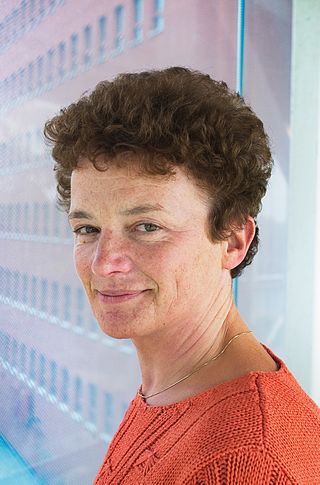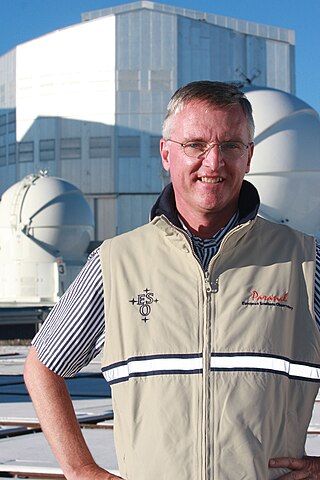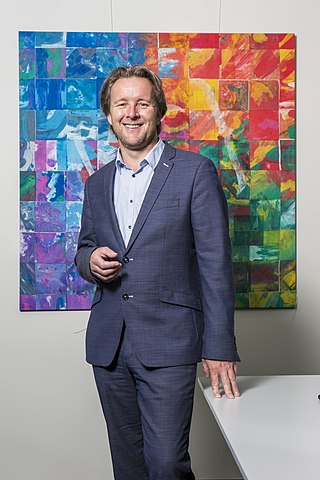
The Vrije Universiteit Amsterdam is a public research university in Amsterdam, Netherlands, being founded in 1880. The VU Amsterdam is one of two large, publicly funded research universities in the city, the other being the University of Amsterdam (UvA). The literal translation of the Dutch name Vrije Universiteit is "Free University". "Free" refers to independence of the university from both the State and the Dutch Reformed Church. Both within and outside the university, the institution is commonly referred to as "the VU". Although founded as a private institution, the VU has received government funding on a parity basis with public universities since 1970. The university is located on a compact urban campus in the southern Buitenveldert neighbourhood of Amsterdam and adjacent to the modern Zuidas business district.

The Royal Netherlands Academy of Arts and Sciences is an organization dedicated to the advancement of science and literature in the Netherlands. The academy is housed in the Trippenhuis in Amsterdam.

Robertus Henricus "Robbert" Dijkgraaf, is a Dutch theoretical physicist, mathematician and string theorist, and the Minister of Education, Culture and Science in the Netherlands from 2022 until 2024. From July 2012 until his inauguration as a minister, he had been the director and Leon Levy professor at the Institute for Advanced Study in Princeton, New Jersey, and a tenured professor at the University of Amsterdam.

Els Goulmy is an eminent professor of transplantation biology, especially regarding minor histocompatibility antigen, at Leiden University. Goulmy is an expert in the area of tissue typing and belongs internationally to the absolute top of her discipline. She was awarded the Spinoza Prize in 2002.

The Spinoza Prize is an annual award of 1.5 million euro prize money, to be spent on new research given by the Dutch Research Council (NWO). The award is the highest scientific award in the Netherlands. It is named after the philosopher Baruch de Spinoza.

Pieter Timotheus "Tim" de Zeeuw is a Dutch astronomer specializing in the formation, structure and dynamics of galaxies. From 2007 to 2017 he was the director general of European Southern Observatory. He is married to astronomer Ewine van Dishoeck. In May 2022, Leiden University suspended him after an internal review concluded that over several years he repeatedly belittled and insulted women in public and abused his position of power as a professor by threatening to damage their scientific careers; and that in addition to intimidation and inappropriate behavior there was "a component of sexual harassment". The Max Planck Institute for Extraterrestrial Physics announced that they will no longer work with him and the European Southern Observatory banned him from accessing their premises.
The International Society for Twin Studies (ISTS) is an international, non-profit scientific organization. The aim of the society is to advance research and knowledge in all fields of science related to twins and/or twin studies, for the benefit of both twins and their families as well as worldwide scientific communities.

The Behavior Genetics Association (BGA) is a learned society established in 1970 and which promotes research into the connections between heredity and behavior, both human and animal. Its members support education and training in behavior genetics; and publish Behavior Genetics, a journal on the topic.

Piek Th.J.M. Vossen, is professor of computational lexicology at the VU University Amsterdam, head of the Computational Lexicology & Terminology Lab, and founder and president of the Global WordNet Association.

Piet Gros is a Dutch chemist and professor biomacromolecular crystallography at Utrecht University. In 2010 he received the NWO Spinoza Prize for the elucidation of the three-dimensional structure of the C3 protein, which plays a central role in the complement system and contributes to innate immunity.

Naomi Ellemers is a distinguished professor of social psychology at Utrecht University since September 2015.

Ineke Sluiter is a Dutch classicist and professor of Greek Language and Literature at Leiden University since 1998. Her research focuses on language, literature, and public discourse in classical antiquity. She was a winner of the 2010 Spinoza Prize. Sluiter has been president of the Royal Netherlands Academy of Arts and Sciences since June 2020, and previously served as vice president from 2018 to 2020.
The Dr Hendrik Muller Prize for Behavioural and Social Sciences is awarded every other year by the Royal Netherlands Academy of Arts and Sciences to a researcher or group of researchers who has made a significant or valuable contribution to the behavioural and social sciences. The award is named after Hendrik Pieter Nicolaas Muller (1859–1941), a Dutch businessman and diplomat.

Marileen Dogterom is a Dutch biophysicist and professor at the Kavli Institute of Nanoscience at Delft University of Technology. She published in Science, Cell, and Nature and is notable for her research of the cell cytoskeleton. For this research, she was awarded the 2018 Spinoza Prize.

Danielle Posthuma is a Dutch behavior and psychiatric geneticist who specializes in statistical genetics. She is a University Research Chair professor at VU University Amsterdam, where she is also head of the Department of Complex Trait Genetics. She has been a member of the Young Academy of the Royal Dutch Academy of Sciences since 2005. She is known for studying the genetics of psychiatric and cognitive traits, including schizophrenia, neuroticism, Alzheimer's disease, insomnia, as well as genetics of intelligence, which she first became interested in researching in the 1990s. In 2019 Posthuma became a member of the Royal Netherlands Academy of Arts and Sciences.
Meike Bartels is a Dutch psychologist and behavior geneticist known for her research on the genetics of happiness and subjective well-being. She is professor in "Behavior and Quantitative Genetics" at the Department of Biological Psychology at VU University Amsterdam and affiliated with the Amsterdam Public Health Institute. She also holds a University Research Chair in Genetics and Wellbeing at the Vrije Universiteit Amsterdam. In 2008, she received the Fuller & Scott Award from the Behavior Genetics Association. She is one of the principal investigators on the study finding genetic variants related to well-being
The Descartes-Huygens Prize is an yearly scientific prize created in 1995 by the French and the Dutch governments, and attributed to two scientists of international level, a French one chosen by the Koninklijke Nederlandse Akademie van Wetenschappen and a Dutch one chosen by the Académie des sciences, to reward their work and their contributions to the French-Dutch cooperation.

Beatrice A. de Graaf is a Dutch history professor at the Faculty of Humanities at Utrecht University. Her areas of expertise are terrorism, international relations and security and the modern history of Europe.

Wim van Saarloos is a Dutch physicist, academic and researcher. He is a Professor of Theoretical Physics at Leiden University

Karin Roelofs (1972} is a cognitive neuroscientist and clinical psychologist known for her contributions in the fields of stress resilience., defensive freeze reactions in humans, neurocognitive mechanisms of emotion regulation in health, professionals at risk and patients with stress-related disorders. Currently she holds the position of Professor of Experimental Psychopathology at the Behavioural Science Institute and is chair of the Affective Neuroscience group at the Donders Institute for Brain Cognition and Behaviour, Radboud University Nijmegen in The Netherlands. Roelofs is a member of the Dutch Royal Academy for Sciences.
















